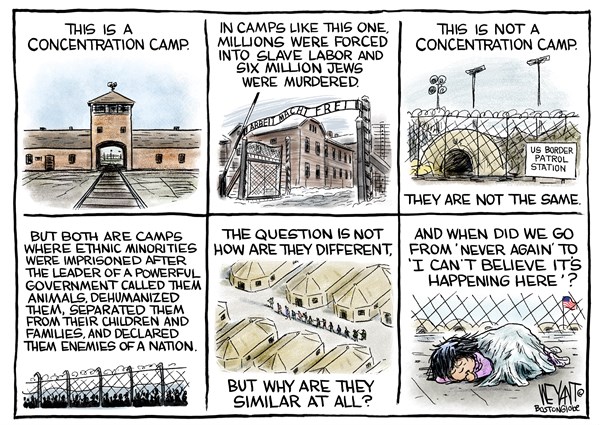
A Cagle cartoon at The Moderate Voice (above) uses images of Nazi concentration camps to bring attention to the plight of detained illegal immigrants and asylum seekers and their children – many separated from their parents – languishing at barbed-wire-enclosed, cage like detention centers.
The final image in the multi-image cartoon depicts a young child, almost a baby, in one of those “cages” and asks, “And when did we go from ‘Never Again’ to ‘I can’t believe it’s happening here’?”
As sometimes happens when parallels are drawn, or even suggested, between the Nazi atrocities and current politics, a thoughtful discussion ensued between two of our readers.
One of them suggested, in part, “’Never again’ is not restricted to the Nazis’ ‘final solution’ (as I understand it), but encompasses all the steps that led to that ultimate atrocity.”
As a descendant of Jews and having had over 100 relatives murdered by the Nazis, I had to put in my two-cents in and commented:
…I would be the first one to take offense to any abuse or misuse of Holocaust symbolism or comparisons but – as [the reader so well says] — the ‘Never Again’ to me means exactly that, Never again condone or turn a blind eye to even the slightest tendencies or indications that we may once again be on our way to conditions reminiscent of the pre-Nazi period.
A few days later, I read about an astonishing, most offensive and bizarre comparison.
Dan Bishop, the Republican candidate for an open House seat in North Carolina, likened his efforts to undermine LGBTQ rights via religious exemptions to the work of Oskar Schindler, a German industrialist who saved Jews during the Holocaust.
I wanted to comment on this as an instance of one end of the political spectrum seeking to “draw on [the Holocaust’s] emotional and historical power to advance [its] completely unrelated agenda.” However, comments are closed.
What I wanted to say is that it is understandable for people to find it offensive when Nazi atrocities, or the Holocaust in general, are used to warn against perceived trends or similarities in our politics or everyday lives.
However, what is not understandable by any measure – what should be categorically condemned — is the use of some of the very few, noble things that occurred in Nazi Germany during that hellish period in history to justify some of the injustices that continue to be perpetrated today.
My reference, above, on one end of the political spectrum drawing on the Holocaust’s emotional and historical power to advance a completely unrelated political goal, comes from an article by Waitman Wade Beorn, in the Washington Post one year ago
Beorn, West Point graduate, Iraq combat veteran, Holocaust and genocide studies historian and the author of “Marching Into Darkness: The Wehrmacht and the Holocaust in Belarus,” after citing examples of “both sides do it,” asks, “Can we truly never compare the Holocaust to events in modern politics?” He answers:
If we truly adhere to the oft-intoned “Never Again,” then we also bear the responsibility of helping others recognize when “again” is now. Shunning comparisons misses an opportunity to mobilize important history for the public good.
Focusing on present-day politics, Beorn offers:
We are not dealing with a genocidal regime in the United States…Many of the elements of the Nazi remaking of Germany into a fascist state are missing or unlikely to arise in the United States…the Nazis themselves did not begin with [the Final Solution] in mind…Rather,[genocides — and dictatorships, for that matter] begin incrementally, with authoritarianism, racism, ethnic myths and dehumanizing language, among other things.
Beorn discusses “Trump’s well-documented use of dehumanizing language,” his “relativist ‘blame on both sides’” comment after the demonstrations in Charlottesville, etc., but makes it clear: “Trump is not Hitler; Hitler was arguably a far more astute politician with deeply held convictions and the means to turn a fledgling democracy into a totalitarian state, something that should be much more difficult here. Nonetheless, these historical comparisons are not hyperbolic and should at least give us pause.
Observing that Americans are woefully ignorant of the Holocaust, Beorn concludes:
Judicious, reasoned and thoughtful comparisons and analogies to the Nazi period, particularly its early years before gas chambers and Auschwitz, could not only encourage the public to take a closer look at current events but also inform them more about the Holocaust that some politicians are now denying ever happened…rather than withdraw the Holocaust from our analysis, we should employ its lessons carefully but powerfully where appropriate to highlight troubling developments in our own country.
Your views?
















